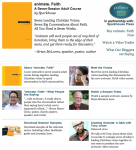I spent a lot of time sitting quietly in the woods this weekend, waiting to shoot a wild turkey who never arrived — he just gobbled at me from behind some trees, mocking my attempt to plate him. So I had a lot of time to think.
Then, I ran my ideas for a blog response to last week’s kerfuffle by Courtney, who had been out of town all weekend, and she gently told me that they were all bad ideas.
As an Enneagram 8, my overriding desire is always always always for justice. Justice for others, justice for me. In years past, I became incredibly morose over the injustices in the Family Court System during my divorce — in fact, in Minnesota it’s called the “Family Justice System,” but my therapist told me to stop calling it that because it’s not really about justice, at least not in the sense that I understand it. (That therapist also refers to me as the “Big Boy Scout” for some of the same reasons.)
What felt unjust to me last week and over the weekend is that I felt unjustly accused, and I felt that I was not heard. David Miller, a frequent critic of mine, wonders the same thing in a less-than-totally-affirming post (that I nevertheless encourage you to read). But Courtney convinced me that spilling more pixels trying to make everyone understand that I really am quite aware of my privilege and my social location won’t help.
So, I am instead going to respond to the heart of Dr. Cleveland’s objection to my talk in Springfield last month: that claiming one version of the gospel is preferable to another version is necessarily exclusionary of diverse voices.
For years I have refused to answer the question, What is the gospel? I’ve been asked that question hundreds of times, since my first book came out. Back in those days, evangelical youth pastors would become absolutely apoplectic when I’d say, “I don’t need to answer that question; just read your Bible,” or, “If Jesus didn’t feel the need to sum up the gospel in a pithy maxim, then I don’t either.”
To answer that question is to foreclose dialogue, and my entire theological career is bent on opening dialogue whenever possible — even catalyzing dialogue through provocation.
Nevertheless, some have asked if I assumed too much when, at Subverting the Norm 2, I asserted, “We have a better version of the gospel than the regnant view in the West.” So, later this week (on Wednesday and Thursday), I will post on the two major themes in my understanding of the gospel: liberation and reconciliation. These two ideas, I am convinced, lie at the heart of the gospel.
But before I write those posts, some prolegomena:
The Medium Matters: A blog post is not a book. They are different media, and should be understood and interpreted differently (just as a talk at a conference should). This is why I sometimes ask my fiercest critics on Twitter which books of mine they’ve read. In a book-length work, an author has the opportunity to work through an idea much more thoroughly. My books also tend to be written with a different voice — one that is more circumspect and less, um, prickly.
I will be painting in broad strokes. I’m reticent to write definitively about the gospel for the reasons above. Nevertheless, I’m going to attempt it, and to attempt it in a way that will create openings for others to debate my thoughts on their merits. If you have a stake in the argument about What Is the Gospel? — which most readers of this blog undoubtedly do — then I hope you will be involved in the ensuing conversation.
I am writing a book on the heart of the gospel. My current book project is on the reason for and efficacy of the crucifixion of Jesus — what theologians call the “atonement.” It’s going to be about 85,000 words. The blog posts are going to be about 1,000 words each. See the difference?
Finally, I appreciate much of the commentary around last week’s post. Did I communicate my thoughts perfectly? No. Was I too defensive, or too aggressive? Probably. But please know that there are private channels of communication, too, so reading a couple blog posts and the related commentary is not the entirety of the picture. And please know that, even when I push back on your comments and ideas, I am always listening and learning — debating is how I learn.
As always, thanks for reading.












